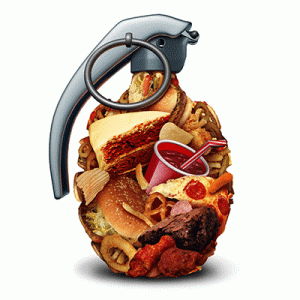Too Rich In Glucose Can Mean Type 2 Diabetes
Type 2 Diabetes is a condition of the body in which the blood is too rich in glucose. The condition is marked by the inability of the pancreas to create enough of the hormone called insulin to properly regulate the amount of glucose in the blood. The condition of Type 2 Diabetes is further complicated and more often than not associated with another equally complex condition called Insulin Resistance. If not treated properly, Type 2 Diabetes can lead to some incapacitating physical conditions including; Heart Attack, Stroke, Blindness, Kidney Failure, and Nerve Damage.
Symptoms of Type 2 Diabetes
• Frequent Urination; A very common symptom of both Type 1 and Type 2 Diabetes. The need to urinate will seem profuse and a constantly pressing concern.
• Constant Thirst; Thirst too will be constant and regardless of liquids consumed the desire to consume liquids will be tireless.
• Weakness; The body will feel unnecessarily tired and without energy. The result of an abundance of sugar in the blood and inability to convert it to energy. A constant lethargy rests upon the body despite proper rest and adequate nutrition.
• Drowsiness; A sense of nausea, drowsiness, lightheadedness, or vertigo-like symptoms can be felt due to an imbalance of chemicals in the brain due to an excess of glucose in the blood.
• Blurred Vision; Vision is foggy and blurred from high glucose making normal vision extremely poor. This excess of glucose in the blood can eventually lead to the retinal nerve damage many diabetics suffer that can further lead to blindness.
Type 2 Diabetes can be detected through a number of these tell-tale symptoms that if witnessed or experienced should not be put off or ignored.

What Causes Type 2 Diabetes
Type 2 Diabetes is caused by the inefficiency of the pancreas to produce adequate amounts of insulin to compensate for glucose that is in the blood. The pancreas is an organ above the stomach, in the digestive system that is responsible for making insulin among other things. Insulin is a hormone that allows the cells of the body to use the glucose that is carried to the body in the blood by acting as a key to the cells allowing the glucose into the cells. In the body, carbohydrates are broken down into single sugar molecules known as glucose that can be used by the cells. In a healthy pancreas, there is a regular production of insulin to break down glucose in the blood. Type 1 Diabetics are said to have the inability to produce any insulin, while in Type 2 Diabetes the pancreas is only compromised and does produce insulin if however not enough to keep blood glucose levels within a healthy range. Non-diabetic blood glucose ranges should be below 100 milligrams per deciLiter; read as 100mg/dL
Diabetics, of course, show higher blood glucose levels and should aim to keep Blood Glucose Levels (BGLs) between 80-120. Consistent BGLs of 140+ are an indicator of inefficient use of glucose in the blood and symptomatic of Type 2 Diabetes.
Get Help With Putting A Diet Plan Together That’s Right For You
Insulin Resistance
Insulin Resistance is a condition that complicates and is usually associated with Type 2 Diabetes. Insulin Resistance is when the cells of the body become less and less responsive to insulin in the bloodstream. This condition results in higher BGLs and consequential production of more insulin. The cell’s receptors of the hormone insulin become less responsive and won’t allow the cell to receive the glucose via the use of insulin as a key to the cell, elevating levels of glucose in the blood. This, as a result, puts more pressure on the pancreas to produce more insulin, exhausting the pancreas and in turn causing further insulin resistance. Type 2 Diabetes is closely related to insulin resistance and they are rarely seen apart from each other. One complicates the other and both add to elevation in blood glucose. Some of the most intriguing contemporary research begs the question; is Insulin Resistance caused by Diabetes or is Diabetes somehow caused by Insulin Resistance? The two concepts are generally always in the same discussion and can never be discussed independently in a holistic discussion of either Type 1 or Type 2 Diabetes.
Complications of Type 2 Diabetes
Type 2 Diabetes can lead to adverse complications on both the macro and micro scale.
Macro Scale; Heart Disease, Stroke, Obesity
Elevated BGLs can lead to clogging of the arteries which we know can lead to Heart Disease and Heart Attack. The same buildup in the arteries can inhibit brain function and also lead to strokes. Because of the high levels of glucose in the blood, excess sugar stored as fat in the body can cause obesity and the host of problems therein.
Micro Scale: Nerve Damage, Kidney Damage, Blindness
Elevated levels of glucose in the blood can damage small capillaries in the veins and arteries causing acute damage to sensitive tissues in the Nerves, Kidneys, and Eyes. Often seen but unfortunate circumstances of consistently high BGLs are Kidney Failure, Blindness, and Amputation. These small scale complications can be dire and are often not seen until the complication has already had a profound effect.
Type 2 Diabetes Results
Type 2 Diabetes occurs when the body doesn’t produce adequate insulin from the pancreas to balance glucose levels in the blood, causing elevated BGLs. Symptoms include frequent urination, constant thirst, nausea, and fatigue. Type 2, as well as Type 1 Diabetes, are complicated by Insulin Resistance where the body’s cells resist the hormone insulin’s ability to allow glucose into the cells further raising BGLs. Complications of Diabetes can be incapacitating and even fatal. These complications include Heart Attack, Kidney Failure, Stroke, and Blindness.
Try Out This Handy Glucose Calculator
About Our Guest Writer:
Tim Delaney, Content Writer. Tim studied Environmental Science at the University of California, Santa Barbara. He is an avid outdoor enthusiast, loves to surf, is passionate about health, and discovering ways to enjoy life with diabetes.

Advertising Disclosure: This post may contain promotional links. Watch the Review may be compensated if you use these links.


Question: numbness in lower part of feet at night or in the morning before getting up; is it symptom type 2 diabetics?
Hello Miroslav,
Thank you for your comment. Here at Watch the Review we review online services and provide articles of interest written by our staff and guest writers. We cannot offer any medical advice in regards to symptoms and encourage you to contact your doctor as soon as you can. ~WTR Team
Interesting article